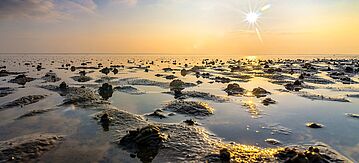Six ordinances on the protection of the marine environment in the North and Baltic Seas have been promulgated in the Federal Law Gazette today. This ensures legal protection under national legislation of the marine protected areas Doggerbank, Borkum Riffgrund and Sylter Außenriff- Östliche Deutsche Bucht in the North Sea and Fehmarnbelt, Kadetrinne and Pommersche Bucht - Rönnebank in the Baltic Sea. The sites are located in the Exclusive Economic Zones (EEZ) in the North and Baltic Seas, which makes them a responsibility of the federal government. The EEZ is the area just beyond the 12 nautical mile-wide territorial sea. The new protected areas cover approximately 30 per cent of the German EEZ.
Federal Environment Minister Barbara Hendricks: "This is a major step forward for marine conservation in Germany. The ordinances finally place key species such as harbour porpoise, common seal and grey seal under effective protection. Valuable habitat types such as sandbanks and reefs will now also be safe from being destroyed or impaired. In drawing up the ordinances, we also incorporated the interests of users and it was therefore possible to establish a balanced level of protection."
The six marine areas have been part of the European Natura 2000 network of protected areas since 2007. This made it mandatory for Germany to protect these areas through necessary measures. The European Commission had already initiated an infringement procedure in this matter, which is now likely to be without cause since the German government placed the marine areas in its responsibility under protection. The infringement procedure was also directed at the federal Länder, who have the obligation to also include land-based Natura 2000 sites in their legal protection scheme.
According to the new provisions, it is no longer permitted to introduce dredging waste into the sea in the marine protected areas, to operate aquacultures or to build up artificial islands. Anyone wanting to generate energy in these areas, exploit natural resources or lay submarine cables has to prove with an impact assessment that the project will not have considerable adverse effects on the marine environment.
Recreational fishing will be covered by a staged protection concept over time and range to reconcile marine conservation interests with those of recreational fishers. In the German Exclusive Economic Zones of the North and Baltic seas recreational fishing is still possible in around 80 per cent of the total area. A mere 20 per cent of the area is regulated by nature conservation provisions.
Currently, use limitations for professional fishing in the protected areas are being drawn up at EU level, the level responsible for fishery management.

